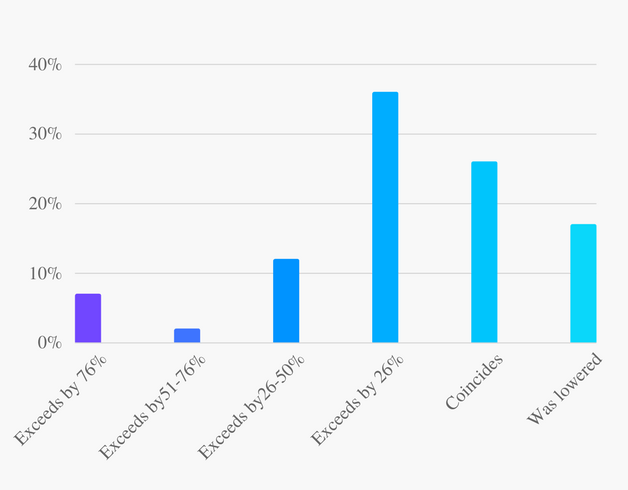
Planning software development budget. Why initial and final costs do not coincide?
So, you’ve decided to build a rich-functional mobile app, create a complex web platform or integrate a CRM system in your company. After a long-lasting search for a suitable software development company, discussions of agreement’s conditions, and scope of work the budget is finally approved.
However, despite a lot of time and efforts goes into budget calculations, most software development projects go beyond planned expenditures. There are many factors for that, so in this post, we’ll get insight into the reasons for budget underestimation and provide you with some tips to avoid it.
To start with, we’d like to provide a bit of illustration of budget issues. Panorama Consulting Solutions company made research: they considered the development of ERP systems and published statistics of when the end budget exceeded/matched the initial, and when it was decided to reduce expenses and make budget lower.
ERP system development. Correspondence of initial and final budgets

Why the initial cost of a software development project doesn’t coincide with the final
1. The difference between “general” and “customized”
Before the beginning of looking for a web/mobile app development company a customer often checks out some general solutions. For example, he or she needs to create a website. On the Internet, the customer finds a plenty of information on how to make a good website as well as hundreds of platforms consisting templates, images, icons for site creation.
So, the customer get approximate cost of site development. Then he goes to a software development company, expresses ideas and requirements, and receives the cost two-three times higher. Why does it happen?
The thing is that box solutions cost lower than the customized, and not all ideas can be placed into the framework of “box”. The web or mobile app development company will take into account all the requirements and will offer the solution tailored to customer’s needs and preferences.
2. Hunting for too low rates
In our practice we had lot of projects with low-quality code we had to rewrite. This is a common situation happening because of a strong desire to save money.
“Too cheap” is often about “too dangerous”. When choosing a software development company with too low rates or freelances can lead to product bad quality, huge time expenditures, and even project incompletion. Applying to software engineers with no practical experience, or with no expertise in the field you need (f.e. banking and finance, ERP systems, IoT solutions, etc.), ot freelances, or just too low rates, you face the risk of large budget extension.
So, try to find balance between the price you are ready to pay (or able to pay) and risks of “too” low prices. And remember that there are many smart ways to cut your expenses. Learn them from our article “8 Ways to cut mobile app development cost”.
3. Choice of non-appropriate pricing model
At the stage of the agreement a software development company makes project estimation, defines the scope of work, and tries to evaluate potential risks. There are several kinds of agreements that determine nature of the working process.
In case of fixed price model, a web / mobile app development company takes into account risks and puts them in cost of the project. There specialists consider unforeseen difficulties, regarding the implementation of certain complex features, changes in the cost of required resources, force majeure situations, and so on. Whether the company faces these risks or not, the custom pays the established cost. It’s better to choose fixed price agreement for standard and non-complex projects, when the task to consider all risks and clearly calculate the budget isn’t so challenging.
For complicated projects it’s more reasonable to choose Time & Material. A software development company makes approximate project estimation in hours, while a customer pays by the hours, spent by professionals for tasks’ completion. There is no final cost, only an approximate, which in the end can be either higher or lower than it was planned.
Though the budget isn’t fixed, you are free to make changes in the requirements, while fixed price doesn’t offer any flexibility. Want to add a new feature? Or change something in mobile app design? The task is included in the scope, the cost becomes higher, and that’s all. Thus, Time & Material also suits best if there are no well-determined and detailed technical requirements.
4. Striving to make everything at once
One of the most common reasons for overbudget is the desire to put hundreds of functions in the product at once. First, though some features can seem useful to you, they may appear unnecessary for final users. Second, the development of large functionality can lead to constant app crashes. Thus, if you build and release all at once, you will need much more efforts for post-launch maintenance.
Also it takes a lot of time to implement all things in the first version. While you’re occupied with the development, the market can start dictating new rules or some other company can release a similar product. So you will have to make some changes in the product which is technically difficult.
In dealing with complex software development projects it’s better to start with minimum viable product (MVP). Instead of a headache related to many product ideas, you choose the main one, define its tasks, and then the key features to solve them.
How it works: you develop a working solution, release, test the product on the target audience, measure their feedback, learn, what to improve, and extend the functionality. This simple way will allow you to save money, avoid abovementioned risks, create a successful solution, and this all without quality loss.
Find more information about MVP advantages in our post “Custom mobile app development. Why should begin with MVP?”.
5. Not enough attention to possible force majeures
Both the customer and software development company often don’t pay enough attention to this point in the agreement. But they should. This point can ensure both sides from force majeure situations, enabling to save money and avoid cooperation problems.
Some project parts/tasks/features can be underestimated, or some team member can need more time to perform task, or some specialist can sick, so in this case a web/mobile app development company takes on the extra expense, having to cover them by themselves.
The payment of the use of some services required for project completion (third-party ones, cloud platforms) can become higher, or there may be other things you can’t control, and you should discuss such situations before starting the development process.
Though it’s practically impossible to take into account everything, both sides should try in order to avoid potential risks, save time and money, and make the best result possible.
To sum up we’d like to say that the key to project success is effective cooperation of the customer and web / mobile app development company as well as strong cohesion of the development team. Before starting any work we advise you to apply to a reliable IT company to get a consultation to the project.
